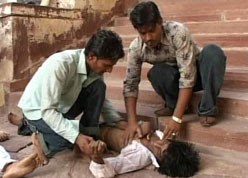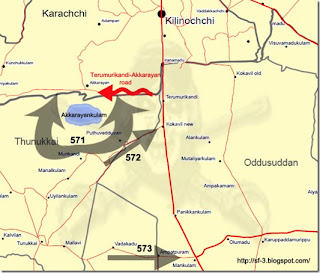All parties, especially the socialists, must unite to defeat the BJP
by U.R. Ananthamurthy
(September 30, New Delhi, Sri Lanka Guardian) WHEN I write to account for the BJP’s rise to power, particularly in Karnataka, I need, as a socialist, to introspect. I want to examine which actions of my mentors, Dr Ram Manohar Lohia and Loknayak Jayaprakash Narayan (JP), led to the transformation of the Sangh Parivar from a cadre-based, relatively contained outfit to a mass party that has retained its secretive cadre base.
Gandhiji wanted the Congress party dissolved after Independence so it would not cash in on its role in the fight for freedom but would make room for all parties to compete in a non-violent, democratic way. Had things gone as he envisaged, Jawaharlal Nehru would have formed a socialist, democratic party and Sardar Patel and C Rajagopalachari a conservative one. We would still have had a nationalist Savarkarian Hindutva party, but it would not have had much space of its own, for that would have been occupied by the conservatives. With their Gandhian background, the conservatives would have been traditional in outlook but largely secular in principle.
This did not happen and, for 30 years after Independence, the Congress seemed rock-like to the people of India. Lohia thought India politics needed to gain momentum and that people should know they could change their rulers. In opposition to the Congress were small parties with a conglomeration of different ideologies, almost like Hinduism — some socialist, some conservative, some even non-secular in their practice. Lohia wanted to create a climate of what he called non-Congressism, which would take shape through an electoral understanding across the opposition so it could take on the Congress which, too, did not have a specific ideology of its own.
Then came the Emergency and, though JP was the anti-Congress movement’s spiritual leader, the well-organised Sangh Parivar was in the forefront of the struggle. With the Jana Sangh’s merger into the Janata Party, the Sangh Parivar began to acquire its mass base. However, the former Jana Sanghis’ dual membership of both the RSS and the Janata Party became an issue, and Morarji Desai’s government fell. George Fernandes, who was guided by Madhu Limaye, played an important role in this. Now, paradoxically, he has done everything he could to give the BJP a respectable place in Indian politics.
JP once remarked in anger that if the RSS was seen as a fascist organisation by some of his followers, he too could be considered a fascist. But the non-Jana Sangh members of the Janata Party always had a problematic relationship with the Sangh section, even during the struggle against the Emergency.
But non-Congressism still seemed to work and, in 1989, VP Singh formed a government with the support of the reincarnated Jan Sangh, the BJP. Earlier, in 1983, Ramakrishna Hegde had also come to power in Karnataka with their support. When JH Patel, a Lohia follower, formed the government in the state, all seemed well until he and Gowda developed serious differences. In 1999, the Janata Dal broke again: Patel allied with the BJP and Gowda led the secular Janata Dal, the JD(S).
In 2004, the JD(S) chose to support the Congress over the BJP to form the state government, but this did not work. Then, in 2006, Gowda’s son Kumaraswamy joined hands with the BJP. Did he have his father’s support? In the beginning, it seemed the son had defied his father, but later on the father blessed the son. As coalition partners, the JD(S) and the BJP agreed to alternate the chief minister’s post after 20 months. When Kumaraswamy’s term ended, he refused to make way for the BJP’s Yeddyurappa. While all the media reported the issue as one of “a transfer of power”, it was only a change in the chief minister’s post. How could it be otherwise when the BJP was also in power even when under Kumaraswamy? Kumaraswamy’s backtracking was seen by most people as unethical. Here is another important point: Yeddyurappa is a Lingayat and Kumaraswamy a Vokkaliga. The lingering rivalry for power between these two, largely land-owning, ‘middle’ communities was inflamed.
High drama followed. Yeddyurappa fails to get the CM’s post and walks away. He goes to Tumkur for a big anti-JD(S) rally, but rushes back to Bengaluru when Kumaraswamy says he wants to make peace. But now Kumaraswamy has conditions the BJP can’t accept. They walk away once again and President’s Rule is imposed on Karnataka.
ITHINK THE BJP fully cashed in on this in this election. The Lingayats are well organised through their mutts, which have done excellent work in social service and education. A 12th century radical poet-activist and saint, Basava still inspires the community. Not only Lingayats but all of us writers look to Basava as a major literary figure.
The BJP is in power now with its communal agenda and with financial backing from the mine owners. They must now be thinking of the coming general election, and how to build their Hindu votebank. Taking their cue from Orissa, they are now attacking churches. The Bajrang Dal and VHP and other such groups appear to be leading the attacks. Until the Centre issued a firm warning to the government, the BJP pretended there were only a few demonstrations against conversion.
What is probably happening now is this: the extremist element in the Sangh Parivar is disgruntled, for Yeddyurappa has ignored party loyalists and made ministers those who joined the BJP after the elections. This element may be looking for a ruthless Modi-like leader to replace Yeddyurappa, who has himself occasionally hinted at this. There is a lesson here. If you nurture a militant fundamentalist group to gain power, it will the moment it can, turn against you.
How do we reverse this? All parties opposed to fundamentalism have to unite, come to an electoral understanding and defeat the BJP. We must undo what JP and Lohia did.
Devegowda, an energetic politician, seems currently to be spearheading the fight against the BJP’s communal agenda. Those who were bitterly critical of his ‘bargaining’, first with the Congress and later with the BJP, are watching him closely. Is he truly repentant? Will the ‘third force’ in Indian politics remain genuinely a third force or will it wait to see whom to join, Congress or BJP, when another election returns another fractured verdi
UR Ananthamurthy is a Jnanpith awardee and a leading writer and contemporary critic.- Sri Lanka Guardian





















